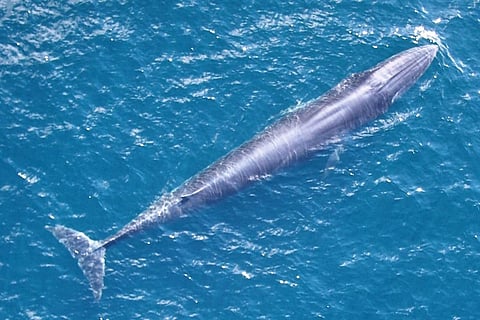US delays rule on Gulf of Mexico whale protections by two years
The US will delay by two years a final rule designating protections for the endangered Rice's whale in the oil and gas drilling region of the Gulf of Mexico, according to an agreement with environmental activist groups filed in a federal court.
The US Commerce Department's National Marine Fisheries Service agreed with green group Natural Resources Defense Council to finalize by July 15, 2027 the geographic area deemed critical for the Rice's whale survival. The previous deadline had been Tuesday, July 15, of this year.
The agreement filed in the US District Court for the District of Columbia on July 3 was seen by Reuters on Monday.
"NMFS continues to make diligent progress on this complex Final Rule," the agreement said. "NMFS, however, requires additional time to analyze the impact of the Rule and evaluate the science underlying it. As part of that process, NMFS plans to coordinate its efforts with the scientific and academic communities."
The delay is the latest turn in a legal battle among conservationists, the oil and gas industry and the federal government over protecting a whale that was only recognized as a unique species in 2021. The Rice's whale was previously considered a Gulf of Mexico subspecies of the Bryde's whale.
Probably fewer than 100 Rice's whales remain in the Gulf of Mexico, according to NMFS. The mammals, which measure up to 41 feet and weigh up to 60,000 lbs, have primarily been seen in the Eastern Gulf, off the coast of Florida, but have also been spotted in western areas off the Louisiana and Texas coasts. The central and western Gulf is where most US offshore oil and gas production occurs.
NMFS officials were not immediately available for additional comment. NRDC, representing the environmental group Healthy Gulf in a 2020 lawsuit over designation of the so-called critical habitat, was also not immediately available for comment.
Oil and gas companies in the region welcomed the delay. Drillers had faced restrictions on how they could operate in key parts of the northern Gulf under a proposal published by former US President Joe Biden's administration in 2023.
That proposal had expanded the whale's critical habitat to the central and western Gulf, potentially putting productive areas off-limits to oil and gas exploration and development. Green groups and government scientists have said that oil and gas operations threaten the Rice's whale's continued existence.
"We strongly support the decision to extend the timeline for finalizing the Rice's whale critical habitat. Given how much work is needed to get this rule right, extending the deadline is both responsible and necessary," Erik Milito, president of the National Ocean Industries Association, an oil and gas trade group, said in a statement.
(Reporting by Nichola Groom; Editing by Mark Porter, David Gregorio and Richard Chang)


